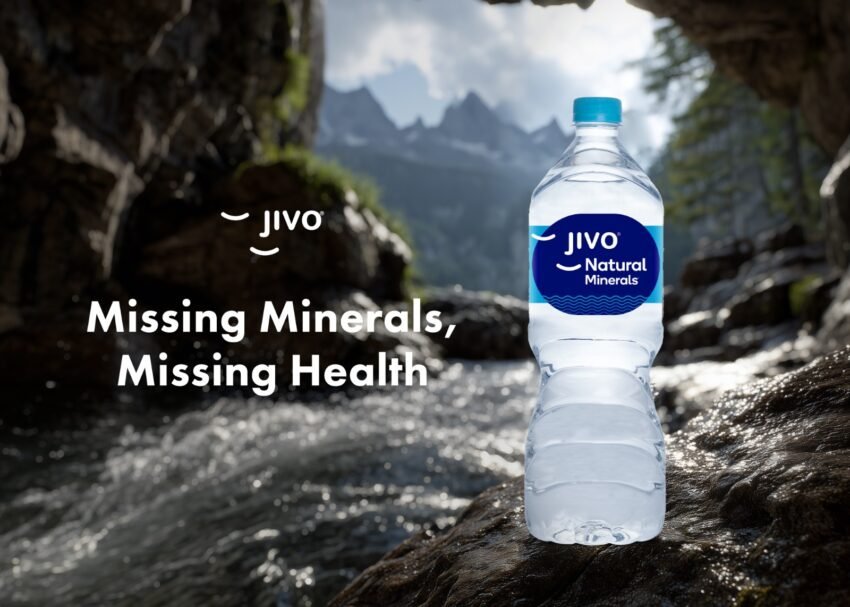Clean water is a big concern for families all over India. In cities like Mumbai, Delhi, and Bangalore, many people face problems with water quality. Because of this, many homes use reverse osmosis (RO) systems. These machines clean the water by removing dirt and germs, but they also take out important minerals our bodies need. The water that comes out is called demineralised water. It looks clean, but it can cause health problems if consumed regularly.
If you want to find the best natural mineral water in India, it’s important to understand what demineralised water is and why it matters for your family’s health.
In this blog, we will explain what demineralised water is, how it’s made, and why many Indian homes use it. We’ll also share some health risks of drinking demineralised water and help you choose safer water options.
Understanding Demineralised Water, A Simple Explanation
Demineralised water is water that has most of its minerals removed, leaving it almost “pure” but not healthy for daily use. Normally, water from rivers, wells, or taps has small amounts of minerals like calcium, magnesium, and potassium, which help keep bones strong and muscles working. When water is demineralised—like in RO filters or distilled water—it loses these minerals and nutrients the body needs.
This process happens because minerals in water are dissolved salts. Removing them makes the water very pure, but it also makes it taste flat and unsatisfying, according to health experts. In India, while water from the ground is usually rich in minerals due to local soil and rock, demineralisation fixes pollution issues but may create new health concerns for families.
For many Indian households and those using filtered jugs or borewell water, this can mean drinking water that doesn’t have the essential minerals the body requires. It is perfect for things like steam irons or car batteries, but not recommended for daily drinking. Long-term use of demineralised water is linked with health risks like weaker bones, muscle problems, and an increased risk of certain illnesses, making it less than ideal for regular hydration.
How Is Demineralised Water Made? Common Methods in India
Demineralised water is created using processes most Indian households know well. The most common method is reverse osmosis (RO). Here’s how it works simply, water is forced through a fine membrane that acts like a super-tight sieve. It blocks germs, chemicals, and minerals, leaving behind clean but mineral-free water.
RO is the most popular method in Indian households due to its effectiveness and affordability. However, the World Health Organization warns that overly purified water, like that from RO, lacks minerals essential for health. While it quenches thirst, it doesn’t replace the minerals lost through sweat and bodily functions, which is critical in hot climates like Delhi’s.
Demineralised water in India is mainly produced by the following common methods:
Reverse Osmosis (RO): Water is pushed through a very fine membrane that blocks germs, chemicals, and minerals. This process removes 90-99% of minerals along with impurities. RO systems are widely used in Indian homes and offices because tap water may contain harmful heavy metals like arsenic and fluoride, especially in states like Gujarat and Rajasthan. The reverse osmosis process may be dangerous because it removes essential minerals from water.
Distillation: Water is boiled to create steam, which is then cooled back into liquid form. The minerals and contaminants stay behind, resulting in purified water. This method is mostly used in laboratories due to its complexity and energy use.
Deionisation (Ion Exchange): Special resins in a system swap mineral ions in the water for harmless ions, effectively removing minerals. This technique is common in industrial settings like pharmaceutical and electronics manufacturing.
Demineralised Water in Daily Life, Where It’s Used
Demineralised water has many uses in daily life and across industries in India.
In homes, RO systems are very common for safe drinking water. They help protect against waterborne diseases caused by bacteria like E. coli or harmful metals like lead, especially in older pipe systems. Schools, hospitals, and transport services like trains also use it to ensure water safety during crises, such as the 2019 Chennai water shortage or ongoing pollution in the Yamuna river.
Industries depend on demineralised water too. Textile factories and pharmaceutical plants in use it to avoid mineral build-up that can damage machines. It’s also used in personal care products like face washes and in appliances like steam irons to prevent mineral residue. Even aquarium owners rely on it to keep fish safe from excess minerals.
Despite its usefulness, drinking demineralised water widely raises health concerns because it lacks natural minerals essential for the body. Approximately 70% of urban Indian households use RO systems, which makes many people miss out on these minerals. This has increased interest in choosing the best natural mineral water in India from trusted sources, offering a healthier balance between purity and essential nutrients.
Thus, demineralised water solves specific problems but its broad use for drinking calls for careful consideration of alternatives rich in natural minerals.
Hidden Health Risks of Demineralised Water
Drinking demineralised water regularly can pose several hidden health risks. The body relies on minerals like calcium and magnesium for strong bones, teeth, and proper muscle function. Since demineralised water lacks these minerals, long-term consumption may cause the body to leach calcium from bones, increasing the risk of osteoporosis, especially in women over 40, and affecting children’s bone development as well.
Heart health can be impacted because magnesium helps regulate blood pressure; without enough in drinking water, there’s a higher risk of heart issues. Electrolyte imbalances like low sodium or potassium can lead to fatigue, muscle cramps, and more serious conditions like hyponatremia. These problems are notable in people with high physical activity such as athletes and farmers.
Pregnant women and children are vulnerable to mineral deficiencies linked with demineralised water, raising risks for pregnancy complications and poor growth. Even cooking with such water can reduce nutrients in food by up to 60%, lowering the nutritional value of meals.
Additionally, using demineralised water in home plumbing may corrode metal pipes, releasing harmful rust or copper into the water supply. This is a concern for older residences and newer buildings alike.
Global studies and the World Health Organization warn that water should contain minimum levels of calcium, magnesium, and total dissolved solids to ensure safety for human health. Drinking demineralised water may be dangerous as it may lead to mineral depletion and increased health risks over time.
Environmental and Practical Drawbacks
Demineralised water, especially produced by reverse osmosis (RO) systems, has several environmental and practical drawbacks:
Energy Use: RO systems consume a lot of electricity, often running continuously like a high-power fan. Producing just one cubic meter of purified water typically requires 3 to 10 kWh of energy depending on the plant size and technology. In regions like Bihar with frequent power shortages, this high energy demand can strain local resources.
Water Waste: RO systems discard about 2-4 litres of water as salty wastewater for every litre of purified water produced. This water wastage is considerable and problematic in water-scarce cities, where every drop is precious.
Impact on Food Taste: In kitchens, demineralised water affects flavour negatively. Minerals in regular water enhance the taste of tea, curries, and other dishes. Removing them can lead to bland or less flavourful meals.
Industrial Costs: For industries, corrosion caused by demineralised water in pipelines leads to frequent repairs and maintenance expenses.
Natural mineral water brands provide a better alternative by offering water that is safe, flavourful, and free of these environmental and practical downsides caused by demineralisation and RO processing.
Why Choose Jivo Natural Mineral Water? A Healthy Choice
Jivo Natural Mineral Water, sourced from pristine Himalayan springs, offers several compelling benefits that make it a healthy choice for Indian families:
Pure Himalayan Origin: Bottled directly from untouched aquifers beneath the Himalayan mountains, it undergoes natural filtration over a 20-year journey through rock layers, ensuring exceptional purity and natural mineral content.
Rich in Essential Minerals: Contains vital minerals like calcium, magnesium, zinc, and sodium, which support strong bones, better heart health, and overall wellness. For example, calcium helps strengthen bones, while magnesium aids in blood pressure regulation.
Balanced pH and Alkalinity: Maintains a near-neutral pH of around 7.2 to 8, helping to neutralize acidity in the body and support digestive health.
Untouched by Human Interference: Bottled at the source with minimal processing, preserving its natural goodness without artificial additives or chemicals. This guarantees you mineral-rich water that retains all the benefits of nature’s filtration.
Enhanced Taste and Freshness: Minerals provide a crisp, refreshing flavour, making every sip a pleasant experience. Its natural mineral profile ensures a smooth, clean taste connected to the grandeur of the Himalayas.
Eco-Friendly and Sustainable: Packaged in responsibly sourced bottles that support environmental sustainability initiatives, aligning with eco-conscious lifestyles.
Choosing Jivo Natural Mineral Water means opting for a product that’s not only pure and safe but also packed with natural minerals that support your health and wellness. It’s a perfect hydration choice for everyday living, travel, or office use, helping you stay healthy while enjoying the essence of the Himalayas.
Choose the Best Natural Mineral Water
Demineralised water may seem safe because it is clean, but it lacks minerals your body needs. Over time, this can harm your health, causing weaker bones, heart issues, and even waste precious water and energy. In a country like India, where water is precious and health matters, picking the best natural mineral water like Jivo is a smart choice. It gives you pure water with all the benefits nature intended.
Next time you pour a glass, remember the minerals. Your body needs them to stay healthy. Share this with friends and family to help them make better choices too. What kind of water do you prefer? Tell us in the comments!


1 thought on “What Is Demineralised Water? Unpacking the Basics and Hidden Risks”